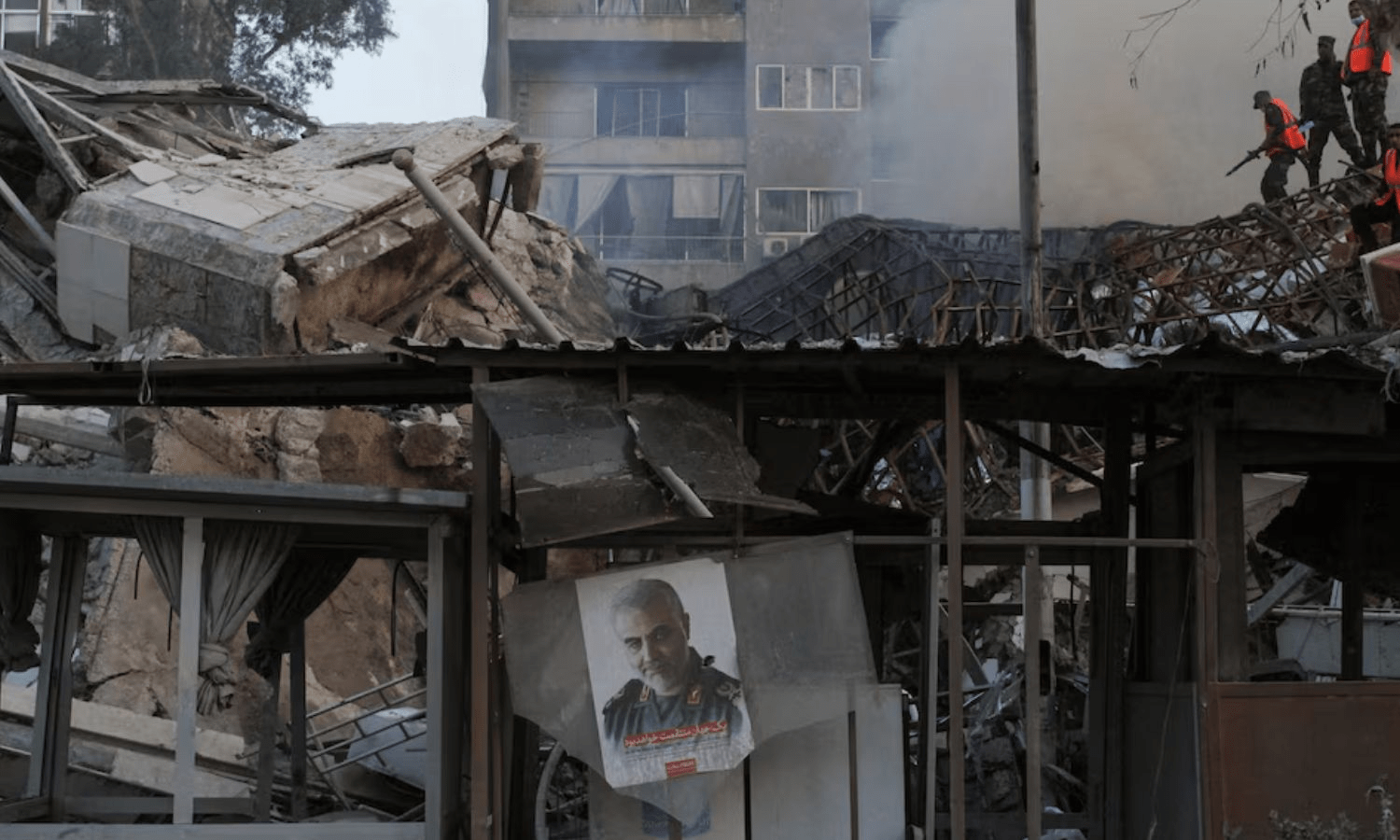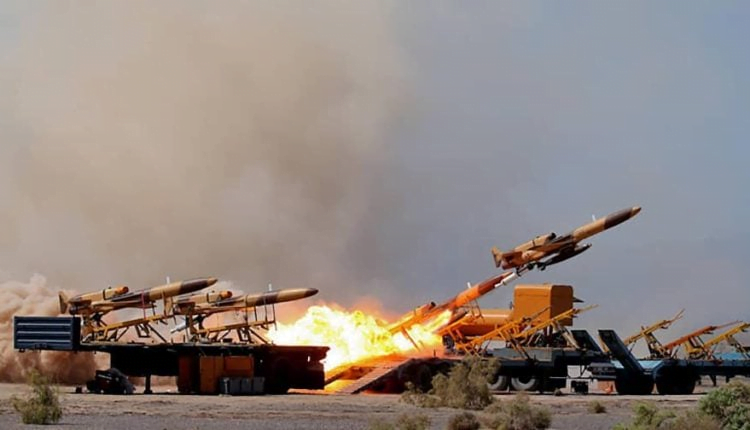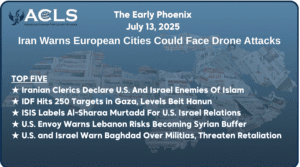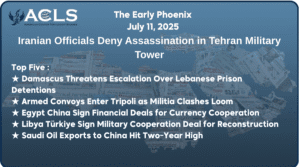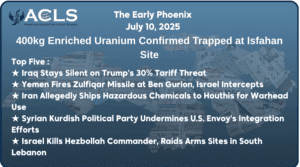Special Report: Israel Shifts Focus to Iran In Syria
Headlines:
- Decisive Israeli Airstrikes in Syria Target Iranian Commanders
- IDF Ends Shifa Hospital Operations, Over 200 Militants Down
- Israel Targets Al Jazeera with New Security Law
★ ISRAEL Vs. IRAN in SYRIA
Israel decisively targets Iran’s leadership in Syria, shifting its focus from Hezbollah in Lebanon. Over the last four days, the IDF has launched operations in Syria aimed at severing the supply lines fueling attacks on its civilians and dismantling Iran’s command structure. Today’s strikes significantly weaken Iran’s influence, further disrupting militia power in Syria.
1.Decisive Israeli Airstrikes in Syria Target Iranian Commanders
Israel conducted its most significant operation against Iranian forces in Syria since the October 7 Hamas attacks. Utilizing F-35s, the Israeli air forces struck a facility associated with the Iranian embassy in Damascus with six precise missiles.
The updated death toll stands at 11, including 8 Iranians, among them 7 leaders and a Revolutionary Guard member, a Lebanese Hezbollah member, and 2 Syrians. Notably killed were Mohammad Reza Zahedi, the Iranian Revolutionary Guard’s commander for Syria, Lebanon, and Palestine, his deputy, his office director, and several advisors, as well as Brigadier General Hussein Amir Allah, Chief of the General Staff for these regions.

Brigadier General Mohammad Reza Zahedi played a central role in the activities of the Islamic Revolutionary Guard Corps (IRGC), especially in its external operations through the Quds Force, known for its military assistance to Hezbollah in Lebanon and fostering close ties between Iran and the group. Zahedi’s involvement extended over three decades, marking him as a key figure in the proliferation of arms and military strategy within the region.
Zahedi assumed command positions within the Quds Force in Lebanon, where he facilitated the shipment of arms and supported military operations, contributing to the sustained conflict in the area. His strategic actions included establishing connections between Hezbollah and Syrian intelligence services, further complicating the already tense situation in the Middle East.
Throughout his career, Zahedi occupied various commanding roles within the IRGC, including the Air Forces, Ground Forces, and the Thar Allah forces responsible for security operations in Tehran. His leadership positions allowed him to influence and direct operations that have been widely criticized for their impact on regional stability and human rights.
The United States sanctioned Zahedi in August 2010, recognizing his direct involvement in sponsoring terrorism and financing activities detrimental to peace and stability in the region. His actions and decisions have had far-reaching consequences, contributing to the suffering of countless civilians and exacerbating conflicts across the Middle East.
Zahedi’s career, characterized by deep involvement in military and strategic operations that have threatened regional and international peace, underscores the significant role played by IRGC officials in supporting actions considered by many as criminal and in violation of international norms. His participation in Hezbollah’s Shura Council meetings and visits to military units near the Syrian border further demonstrate his active engagement in operations deemed hostile by various governments and international bodies.
Iran’s Foreign Minister, Hossein Amir Abdollahian, denounced the attack as a deranged act by Netanyahu, indicative of his lost sanity in the face of failures. Iran described the strikes as “barbaric and brazen,” flagrantly violating international laws, including the 1961 Vienna Convention. The assault not only contravenes international law but also represents a desperate Israeli effort to destabilize the region, threatening severe repercussions while jeopardizing global peace, stated Iranian Foreign Ministry spokesman Nasser Kanaani.
Later in the day, Syrian media sources reported that American forces at the Al-Tanf base in Syria neutralized a suicide drone close to their location, while the Israeli military intercepted a cruise missile within Syrian territory, preventing it from reaching the Golan Heights. Israel immediately responded by striking the area where the missile was fired from in the suburbs of Daraa.
On Thursday March 28, 2024, Israeli strikes targeted a secret meeting place for the IRGC in Sayyidah Zaynab, approximately six miles south of Damascus.
After midnight, on Friday March 29, Israel launched precise air strikes on Aleppo targeting a Hezbollah arms depot near Aleppo International Airport and defense factories in Safira. The total death toll reported is 53 fighters 38 of which are Syrian regime forces, seven Hezbollah members and eight pro-Iran Syrian militants. Contrary to regime claims, no civilian casualties were documented. This operation was the first of Israel’s operations and marks the highest number of death tolls amongst Iranian fighters since 2020.
Local media sources reported that Iranian militias immediately began to change a number of their missile strike bases closer to the American base in the Conico oil field. It was also reported that the Iranian militias in Deir Ezzor where the Israelis continue to strike went ahead and launched a special special training course for 30 members of Iraqi and Lebanese nationalities to train on hacking communications devices and mobile phones, hacking websites, in addition to hacking accounts through various applications on social media sites.
On Sunday, March 31, Israeli forces launched at least four missiles at the Scientific Research Institute in Jamraya, Damascus. This site, once linked to chemical warfare, is now reportedly a hub for developing Iranian weapons, including long-range missiles and drones. The Intel Times Center highlights that Aleppo serves as a key conduit for weapon transfers to Hezbollah, managed by the Quds Force of the Iranian Revolutionary Guard, leveraging Syrian Army infrastructure.
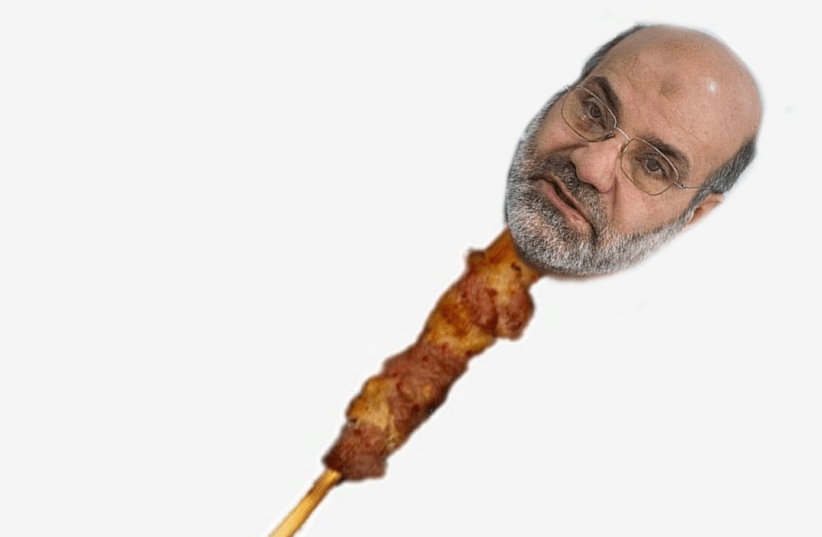 In the aftermath of the assassinations, reactions on social media varied widely, with notable celebrations among both Iranian and Arab users. This celebration was evident through creative and symbolic postings, including images and messages that used metaphors like skewers and patties to express joy over Zahedi’s death. Iranian activists and journalists, both within Iran and in exile, marked the event with posts that mingled the themes of the Sizdah Bedar holiday with the news of the assassination, highlighting a sense of relief and hope for change. These reactions underscored deep-seated grievances against the IRGC’s actions and Zahedi’s role in particular. Meanwhile, Arab social media users also shared in the celebrations, albeit with less direct attribution to Israel’s role in the assassination, indicating a complex mix of regional sentiments towards Iran’s influence. The varied online reactions reflected broader tensions in the Middle East, illustrating the divisive figure Zahedi was, celebrated by some as a martyr and by others as a symbol of oppression.
In the aftermath of the assassinations, reactions on social media varied widely, with notable celebrations among both Iranian and Arab users. This celebration was evident through creative and symbolic postings, including images and messages that used metaphors like skewers and patties to express joy over Zahedi’s death. Iranian activists and journalists, both within Iran and in exile, marked the event with posts that mingled the themes of the Sizdah Bedar holiday with the news of the assassination, highlighting a sense of relief and hope for change. These reactions underscored deep-seated grievances against the IRGC’s actions and Zahedi’s role in particular. Meanwhile, Arab social media users also shared in the celebrations, albeit with less direct attribution to Israel’s role in the assassination, indicating a complex mix of regional sentiments towards Iran’s influence. The varied online reactions reflected broader tensions in the Middle East, illustrating the divisive figure Zahedi was, celebrated by some as a martyr and by others as a symbol of oppression.
2.IDF Ends Shifa Hospital Operations, Over 200 Militants Down
The IDF has officially concluded its intensive two-week operation at Gaza City’s Shifa Hospital, marking a significant phase in the ongoing conflict that began with Hamas’s assault on October 7. This pivotal raid resulted in the neutralization of over 200 terror operatives and the detention of 500 more, amid notable destruction. As the operation wraps up, the military’s focus on dismantling key figures from Hamas and the Palestinian Islamic Jihad has notably intensified the war’s dynamics, bringing the IDF’s casualties to a total of 600 since the conflict’s start. Despite Hamas’s assertions to the contrary, the IDF’s findings revealed substantial evidence of the hospital’s use for military purposes. The completion of the operation unveils the extensive damage to Shifa Hospital and its surrounding areas, shedding light on the profound consequences and the escalated nature of the Israel-Hamas conflict, underscored by a significant toll on human life and infrastructure.
3.Israel Targets Al Jazeera with New Security Law
The Knesset has enacted a groundbreaking law, putting Al Jazeera in the spotlight by granting the Israeli government the authority to temporarily halt operations of foreign news organizations deemed a threat to national security. This measure, specifically aimed at Al Jazeera, passed convincingly with a 71 to 10 vote, allows for a 45-day suspension of such networks’ operations, subject to renewal by the prime minister and communications minister. The law’s introduction, led by Communications Minister Shlomo Karhi, is a direct response to longstanding accusations against Al Jazeera for its reportage, which, according to Israeli officials, jeopardizes the country’s security by purportedly siding with Hamas and compromising IDF troop safety. Despite the law’s intended security benefits, it has triggered significant backlash, including criticism from international bodies like the White House, for potentially stifling press freedom.
=======================
📌 Incase you missed it,
📰 THE EARLY PHOENIX March 28, 2024
🔗 Follow the latest news from the American Center for Levant Studies via Google News

